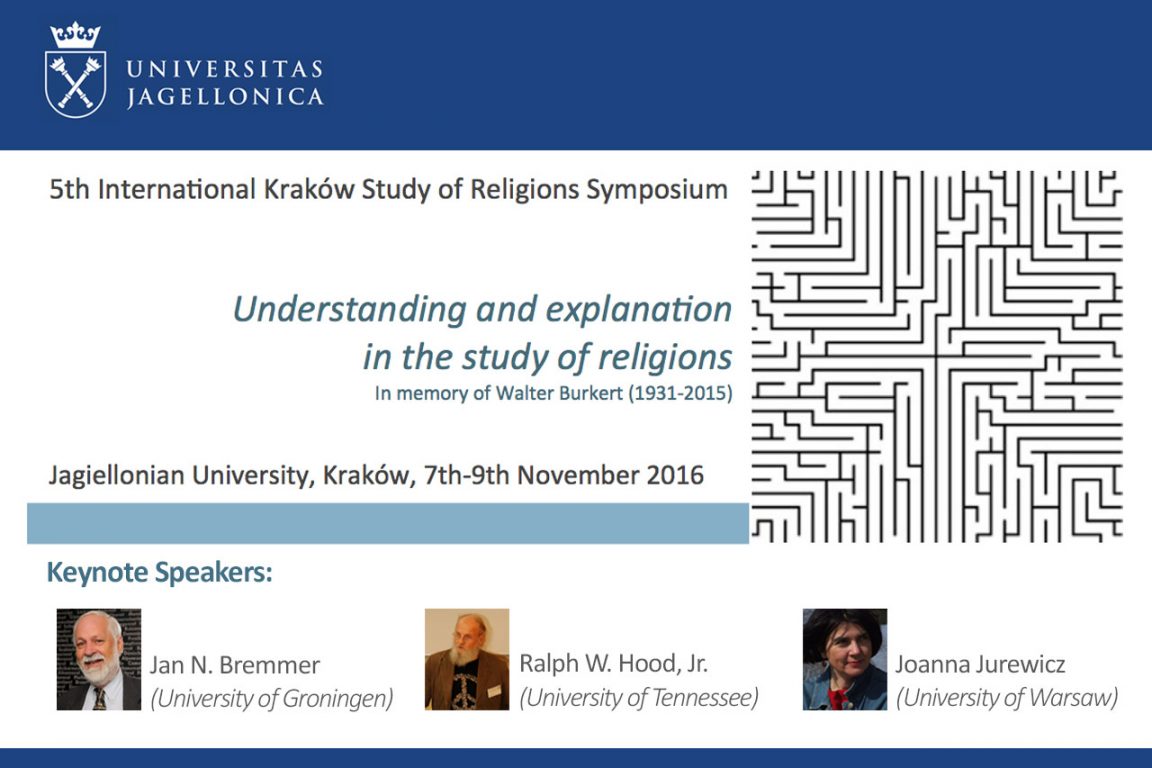Understanding and Explanation in the Study of Religion(s)

About The Event
5th International Krakow Study of Religions Symposium
In memory of Walter Burkert (1931-2015)
Date: November 7-9, 2016
Venue: Jagiellonian University, Kraków, Poland
Keynote addresses:
- Jan N. Bremmer, University of Groningen, Emiritus
- Ralph W. Hood, Jr., University of Tennessee at Chattanooga
- Joanna Jurewicz, University of Warsaw
The merit of the academic study of religions lies in its ability to undertake interdisciplinary and multidisciplinary approaches. Its subject, religious beliefs and behavior, can be understood as a historical, cultural and social phenomenon. On the other hand, religion seems to be a universal human trait, explainable by means of scientific methods of evolutionary biology, ethology, neuroscience, or genetics. If we try to locate the study of religions in the overlapping fields of humanities and science, it seems worthwhile to recall the distinction between understanding (Verstehen) and explaining (Erklären) as proposed by Wilhelm Dilthey.
The founding myth of the discipline tells a story of the liberation of research from the hegemony of theology, and of the creation of an empirical discipline. Understanding religious phenomena was proclaimed one of the main objectives of our research. At the beginning, religious texts were approached as data to be commented on and interpreted through the use of philological and historical methods. Later, the birth of anthropology, sociology and psychology of religion contributed to the broadening of the field, and to the introduction of new methodologies. Recently, new research fields, such as evolutionary psychology, genetics, cognitive sciences and sociobiology, changed the landscape and climate of the study of religions by applying state-of-the-art scientific methods in hope of explaining religious beliefs and behavior.
We would like to dedicate this edition of the Kraków Symposium to the memory of Walter Burkert, a philologist, historian, and a scholar of classics who undertook a search for “tracks of biology” in religious phenomena. Approaches such as his made it possible to bring religious traditions of the past to the contemporary laboratory for the study of religions.
Main Topics:
- contribution of philology to understanding of religious phenomena (classical philology, Bible studies, Indology);
- language as a source of data for the study of religion;
- “from biological programs to semantic chains”: ways of explaining or understanding myths and rituals (historical, anthropological and biological perspectives);
- anthropology of sacrifice (texts, images and theories);
- religion and power: rituals of submission, movements of disobedience;
- religion – morality relationship in cultural evolution from antiquity to the present day;
- understanding and explaining the human propensity to sacrifice one’s life for genetic strangers;
- nomothetic/idiographic controversy and the academic study of religion
- quality and quantity in the methodology of scientific studies of religion
- cognitive studies of religion and the problem of reductionism
- religion and the theory of the levels of integration (strata ontologies, religion as emergent quality)
- cybernetics and system theory as integrative paradigm for the studies of religion
Conference website: http://www.religions.confer.uj.edu.pl/en_GB/


We're always eager to hear from you.
If you’d like to learn more about us or have a general comments and suggestions about the site, email us at